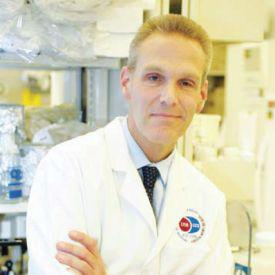
Research Topics
The Center for Immuno-Oncology (CIO) Translational Research area's strategic plan focuses on the development of novel vaccines for human carcinomas, not only as monotherapies, but more importantly in combination with other immune-mediating modalities, and other conventional or experimental therapies, as part of an immune-oncology programmatic effort.
Overview. The Immunotherapeutics Section is involved in the development of novel recombinant vaccines, and vaccine combinatorial therapies. We study both mechanistically and operationally how certain radiation modalities, chemotherapy agents, small molecule targeted therapies, and immune modulators a) alter the tumor to become an immunostimulatory milieu, or b) modulate the tumor microenvironment to create a more immunopermissive hub, to enhance vaccine efficacy. Our team has worked independently and collaboratively with the CIO on the design, engineering, and development of recombinant poxvirus and yeast-based cancer vaccine platforms. The poxviral vector-based vaccines contain transgenes for tumor antigens and for multiple synergistic costimulatory molecules.
Research Focus. Immune consequences of cancer therapy include both direct effects on tumor cells and modulation of the immune system. My laboratory has focused on two areas: immunogenic modulation and immune subset conditioning. Immunogenic modulation describes the mechanism of how anticancer therapies alter the biology of the surviving tumor cells to render them more sensitive to immune mediated killing. Immunogenic modulation encompasses a spectrum of molecular alterations in the biology of the cancer cell that independently or collectively make the tumor more amenable to cytotoxic T lymphocyte (CTL)‒mediated destruction. Immune subset conditioning describes how anticancer therapies mediate the peripheral and/or intratumoral reduction of negative regulatory elements into a more immune-permissive environment for vaccine immunotherapy. Understanding the underlying mechanisms of these areas provide a rationale for the use of immunotherapy in combination with radiation, chemotherapy, small molecule inhibitors, and immune modulators. For a list of publications from the Immunotherapeutics Section, see Dr. Hodge's Full PubMed Summary.
Biography
Dr. Hodge is a Senior Investigator, Deputy Director for Translational Research in the Center for Immuno-Oncology, National Cancer Institute, and head of the Immunotherapuetics Section. Dr. Hodge received his Ph.D. in Comparative and Experimental Medicine from the University of Tennessee, and his MBA from the George Washington University. He was awarded tenure in 2016. Dr. Hodge is active in the area of tumor immunity, and has made significant contributions to the design and development of novel recombinant vaccines and vaccine strategies for cancer immunotherapy including a) recombinant vectors to deliver tumor antigens, b) the use of costimulation to enhance antitumor T-cell responses, c) the combined use of vaccines with radiation, chemotherapy, and targeted small-molecule therapeutics. The concepts and therapeutics developed within the Immunotherapeutics Section have been translated into many randomized multi-center trials at numerous Cancer Centers.
Selected Publications
- Gameiro SR, Jammeh ML, Wattenberg MM, Tsang KY, Ferrone S, Hodge JW. Radiation-induced immunogenic modulation of tumor enhances antigen processing and calreticulin exposure, resulting in enhanced T-cell killing. Oncotarget. 2014;5(2):403-16.
- Ardiani A, Farsaci B, Rogers CJ, Protter A, Guo Z, King TH, Apelian D, Hodge JW. Combination therapy with a second-generation androgen receptor antagonist and a metastasis vaccine improves survival in a spontaneous prostate cancer model. Clin Cancer Res. 2013;19(22):6205-18.
- Hodge JW, Garnett CT, Farsaci B, Palena C, Tsang KY, Ferrone S, Gameiro SR. Chemotherapy-induced immunogenic modulation of tumor cells enhances killing by cytotoxic T lymphocytes and is distinct from immunogenic cell death. Int J Cancer. 2013;133(3):624-36.
- Gameiro SR, Caballero JA, Higgins JP, Apelian D, Hodge JW. Exploitation of differential homeostatic proliferation of T-cell subsets following chemotherapy to enhance the efficacy of vaccine-mediated antitumor responses. Cancer Immunol Immunother. 2011;60(9):1227-42.
- Hodge JW, Sabzevari H, Yafal AG, Gritz L, Lorenz MG, Schlom J. A triad of costimulatory molecules synergize to amplify T-cell activation. Cancer Res. 1999;59(22):5800-7.
Related Scientific Focus Areas
This page was last updated on Monday, December 1, 2025


